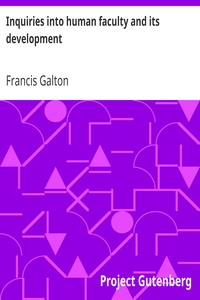Inquiries into Human Faculty and Its Development by Francis Galton
"Inquiries into Human Faculty and Its Development" by Francis Galton is a scientific publication first published in the late 19th century. This work explores a range of topics related to human characteristics and faculties, including heredity, mental processes, and the potential for improvement within the human race through eugenics. Galton's approach is rooted in empirical investigation and statistical methods, reflecting the period's growing interest in applying scientific principles to human behavior and
society. The opening of the book introduces Galton's intent to compile the insights from various prior writings into a cohesive study. He articulates his desire to explore human faculties comprehensively, noting that understanding the full range of these differences is crucial for considering how humanity might be improved for future generations. Galton emphasizes the importance of avoiding preconceived notions when evaluating different races and recognizes that inherent differences among people can be beneficial. The introduction sets the stage for a detailed inquiry into the measurements and characteristics that define human faculties and considers the implications these have for evolution and societal progress. (This is an automatically generated summary.)
Read or download for free
| How to read | Url | Size | |||
|---|---|---|---|---|---|
| Read now! | https://www.gutenberg.org/ebooks/11562.html.images | 666 kB | |||
| EPUB3 (E-readers incl. Send-to-Kindle) | https://www.gutenberg.org/ebooks/11562.epub3.images | 674 kB | |||
| EPUB (older E-readers) | https://www.gutenberg.org/ebooks/11562.epub.images | 680 kB | |||
| EPUB (no images, older E-readers) | https://www.gutenberg.org/ebooks/11562.epub.noimages | 314 kB | |||
| Kindle | https://www.gutenberg.org/ebooks/11562.kf8.images | 3.5 MB | |||
| older Kindles | https://www.gutenberg.org/ebooks/11562.kindle.images | 3.4 MB | |||
| Plain Text UTF-8 | https://www.gutenberg.org/ebooks/11562.txt.utf-8 | 638 kB | |||
| Download HTML (zip) | https://www.gutenberg.org/cache/epub/11562/pg11562-h.zip | 683 kB | |||
| There may be more files related to this item. | |||||
Similar Books
About this eBook
| Author | Galton, Francis, 1822-1911 |
|---|---|
| Title | Inquiries into Human Faculty and Its Development |
| Note | Wikipedia page about this book: https://en.wikipedia.org/wiki/Inquiries_into_Human_Faculty_and_Its_Development |
| Note | Reading ease score: 52.3 (10th to 12th grade). Somewhat difficult to read. |
| Contents | Variety of human nature -- Features -- Composite portraiture -- Bodily qualities -- Energy -- Sensitivity -- Sequence of test weights -- Whistles for audibility of shrill notes -- Anthropometric registers -- Unconsciousness of peculiarities -- Statistical methods -- Character -- Criminals and the insane -- Gregarious and slavish instincts -- Intellectual differences -- Mental imagery -- Number-forms -- Colour associations -- Visionaries -- Nurture and nature -- Associations -- Psychometric experiments -- Antechamber of consciousness -- Early sentiments -- History of twins -- Domestication of animals -- The observed order of events -- Selection and race -- Influence of man upon race -- Population -- Early and late marriages -- Marks for family merit -- Endowments -- Conclusion. |
| Credits | E-text prepared by Juliet Sutherland, Robert Prince, and the Project Gutenberg Online Distributed Proofreading Team |
| Language | English |
| LoC Class | BF: Philosophy, Psychology, Religion: Psychology, Philosophy, Psychoanalysis |
| Subject | Ability |
| Subject | Eugenics |
| Category | Text |
| EBook-No. | 11562 |
| Release Date | Mar 1, 2004 |
| Most Recently Updated | Dec 25, 2020 |
| Copyright Status | Public domain in the USA. |
| Downloads | 319 downloads in the last 30 days. |
| Project Gutenberg eBooks are always free! | |

